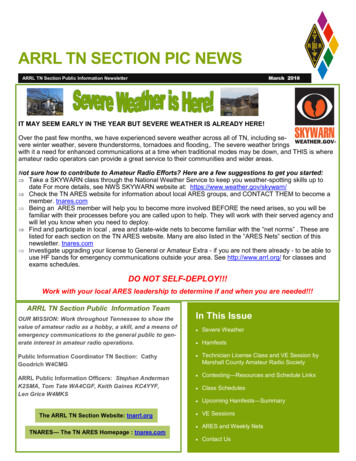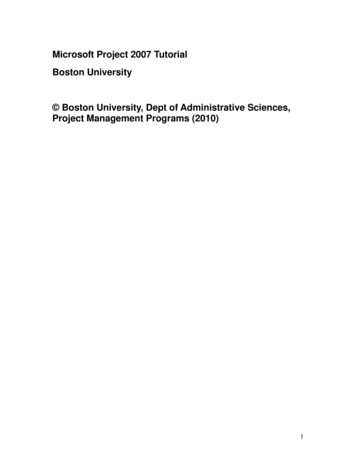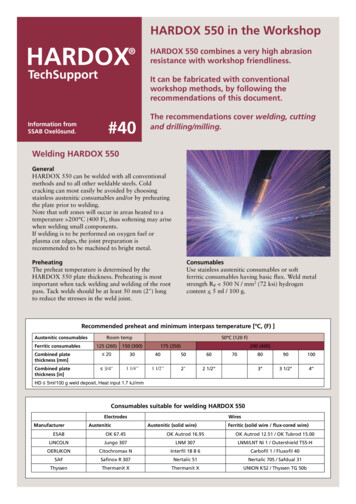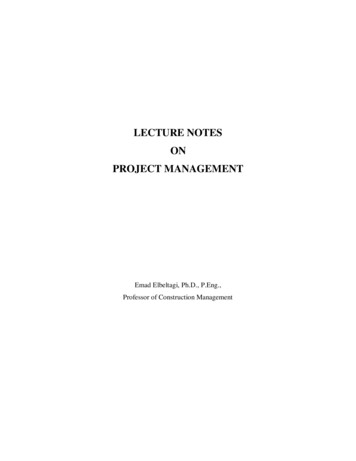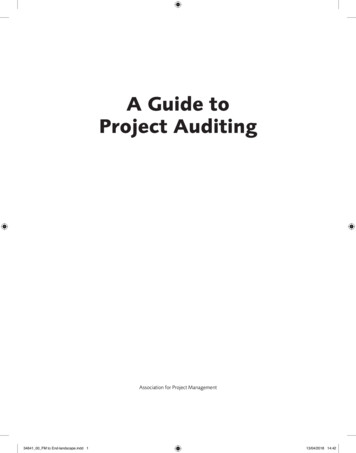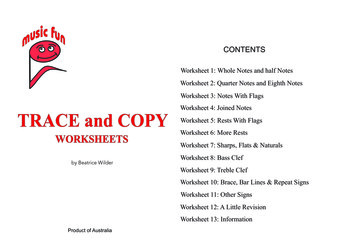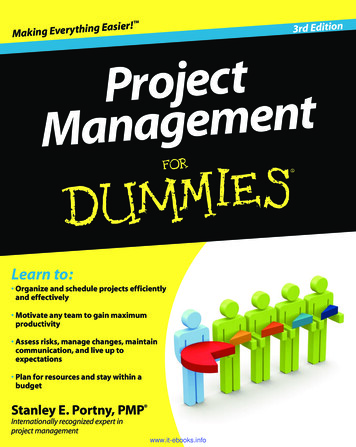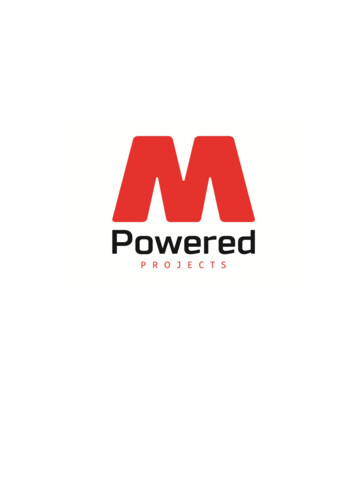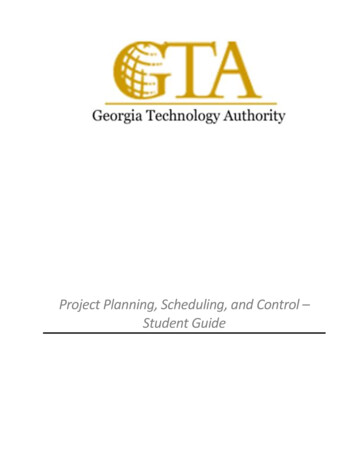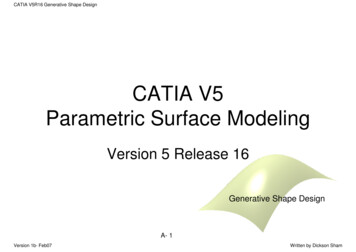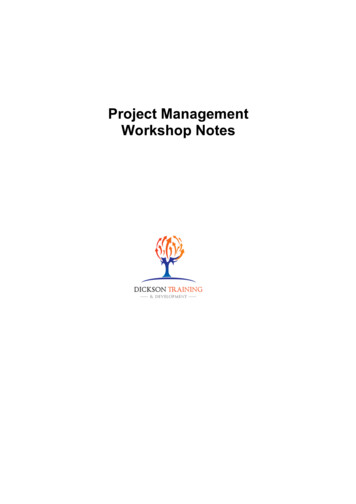
Transcription
Project ManagementWorkshop Notes
CONTENTSWHAT IS A PROJECT? . 3THE PROJECT MANAGEMENT LIFECYCLE . 16TOOLS & TECHNIQUES . 22MONITORING &CONTROL . . 46MANAGINGPEOPLE . . 47MANAGINGMEETINGS . 53Project Management2
WHAT IS A PROJECT?Projects can cover many activities from small short-term ones to multi-million poundtasks that last for many years. However, they all have common elements. The maincharacteristics of a project are:o A fixed timescaleo Clear objective(s)o A temporary team of peopleo No practise or rehearsalo They carry risk and uncertaintyo Has a clearly identifiable start and finisho An instrument of changeo Has a specific aimo Results in something being delivered/providedo Is uniqueo Is the responsibility of a single person or bodyo Includes costs, resources and timeo Uses a wide variety of resources and skillsProject Management3
Some Definitions of Project Management:o A set of related activities having a defined start and finish time, with specificobjectives and/or deliverables to a standard of quality agreed with thecustomer.o Any task that has a beginning and an end and has to be managed.o A set of related activities of sufficient magnitude or importance to warrant thededication of an organisational element to produce and/or have overallresponsibility for it.o A large and often complex process to produce a defined end result to agreedtime, cost and quality objectives.o A series or related activities with a start and end date, to implement adesigned solution to a specified requirement.o A unique set of co-ordinated activities, with definite starting and finishingpoints, undertaken by an individual or organisation to meet specific objectiveswithin defined schedule, cost and performance parameters.o Working to achieve a specific task within a given resource framework of timemoney and people.Project Management4
The difference between Project Management and Operational ManagementProject ManagementOperational ManagementA life-cycle that ends when the project iscompleted.Continuous life from year to year.Multi-disciplinary ream.Uses a set of specialist skills.Temporary project team.Stable organisation.Usually not done before.Repetitive and well known.Work must be done within time and costconstraints.Maximum work is done within annualbudget.Cancelled if objective(s) cannot beachieved.Continued existence assured.Finish date and cost are difficult topredict.Annual expenditure easily calculated.Start and end date.No specific dates other than the financialyear.Project Management5
Why do projects fail?There are many reasons why a project may fail. Some examples are listed below:o Project not clearly definedo Content/scope of project not clearly understoodo Over-estimating availability/capability of resourceso Promise more than can reasonably be deliveredo Poor handling of unforeseen snagso Weak control procedureso Poor communicationso Selecting the wrong Project Managero Inability to estimate requirements accuratelyo Reluctance to end projecto Lack of upper management supporto Project team’s abilities are insufficiento Poor commitment to project by teamo Ineffective planning and controlo Presence of bureaucracy (organisational/controls)o Project Manager not readily availableo No clearly established criteria for successProject Management6
Project Management - Getting It RightDiseaseSymptoms1. No real goalso Goals not specific, measurable,realistic or time boundo No sub-goals or action planso Lack of priorities on tasks andaction planso Activity orientated not goalorientatedCure: Set specific, time bound, measurable goals, with sub-goals andaction plans.2. Failure to anticipate obstacleso Excessive optimismo No alternative strategieso Conflicts are ignored or notrecognisedo Missed deadlineso Little support when neededo Crisis managementCure: Be flexible in planning, anticipating as far as possible obstacles andways to overcome them. Spend time on potential problem analysis.Be realistic.3. Lack of milestoneso ‘It can wait’o ‘I can remember that’o ‘I’ll know how we’re doing whenwe get there, let’s play it by ear’o Uncertain of progresso Lack of reviews or revisionProject Management7
Cure: Set specific task milestones and progress review dates; stick tothem and revise when needed.4. Lack of commitmento ‘I told you it wouldn’t work, itwasn’t my plan’o Procrastinationo Focus on routine and dailyactivitieso Goals or milestones notachievedo Lack of specific action taken tomeet goalso Lack of prioritieso Missed meeting or appointmentsCure: Agree goals at the outset; carry out joint reviews, negotiate,compromise and share information. Meet periodically and reviewprogress.5. Failure to revise goalso Plan never changeso Inflexible or stubborn in face offeedback, dictating changeo Unresponsive to changingsituationo Help not sought when neededo Time wasted on unproductivetasksCure: Meet periodically to review progress towards goals and assesssituation. Change emphasis or approach as appropriate.6. Failure to learn from experienceProject Managemento Lost sight of goals8
o Mistakes are repeatedo Feedback is ignored or deniedo Same routine – same crisis asbeforeo Unwillingness to change theway of doing thingso Not asking ‘what did we learnfrom this?’Cure: Set improvement and learning objectives. Use milestones to reassess and review. Collaborate more frequently in trackingprogress and learning. Meet at the end of the project to reviewsuccesses, weaknesses, milestones, approaches etc.Project Management9
THE ROLES OF THE PROJECT TEAM MEMBERSProject SponsorThis is the person who has commissioned the project. They will usually set theTerms of Reference, budgets and timescales and have a vested interest in thecompletion of the project. In addition, they will be kept informed by the ProjectManager of progress, obstacles and milestones. At the end of the project, theProject Sponsor may request a formal presentation of the project and its findings inaddition to a written proposal.Project Steering GroupA Project Sponsor may appoint a Steering Group to help the project run smoothly.The Steering Group’s main responsibility is to ensure that all those involved in theproject have access to relevant information and resources. The Steering Group isusually made up of people who have a vested interest in seeing the project succeedand will meet throughout the project to review and assess progress. Project SteeringGroups are set up at the discretion of the Project Sponsor and are not alwaysnecessary.Project ManagerThis is the person who is accountable for achieving the projects aims and objectivesto time, cost and through the day to day leadership of the project team. They areresponsible for delivering the project in terms of time, cost and quality.During all phases of the project life cycle the Project Manager must be in closecontact with the end uses - the customer and other members of the Project Team.Project Team MemberA person who brings specialist knowledge to the project. They are usuallyaccountable for one aspect of the project.Project Management10
The Qualities of a Successful Project ManagerProject Manager QualitiesHow many companies have internal selection procedures for Project Managers?Very few, yet there are special qualities required in a project manager. The jobdescription is relatively straightforward:Job descriptiono Problem definition and solvingo Resource estimation and schedulingo Recognition of interfaces and constraintso Assessment of quality and reliabilityo Optimisation of valueo Control of resources and performanceProject Management11
But what about the person specification? The following are primarily essential for agood project manager:o Understanding the Company’s businesso Understanding the technologyo Understanding the cultureo Understanding the customer baseo An awareness of basic management conceptso An awareness of management styleso Leadership skillso Appraising skillso Ability to communicate and motivateo Interpersonal skillso Ability to conceptualiseo Creative abilityProject Management12
An interesting exercise is to task your colleagues to prioritise the followingcharacteristics of an ideal Project Manager. It will be very interesting to see how thevarious disciplines of a Project Group see the ‘task and process’ items interfacing.‘Ideal’ Project Manager1. Technician2. Systems thinker3. Communicator4. People-manager5. SalespersonDepending on whether your project team workers see a project manager’s roles astechnically oriented or people oriented, they will see 1 and 2 or 3 and 4 as theprimary role - be warned if you are an opposite!The Project Manager (The individual)Project Management13
Knowledge:o Planningo Schedulingo Quantitative knowledgeo Management theoryo Accounting/finance/budgetsSkills:o Problem solvingo Decision makingo Organisingo Controllingo Leadingo Negotiatingo Creativityo Communicatingo Systematic workingAttributeso Motivationo Authorityo Responsibilityo Self analysiso Styleo Delegationo Understanding peopleProject Management14
The Benefits of Project ManagementIt allows the following to be accomplished:o The direction of scarce resources what are judged to be the most desirableobjectives, and to do this profitably.o To focus appropriate management skills on to specific tasks.o To secure commitments to deliver results from those wishing to proceed withthe project.o To direct major elements of the business without being submerged in detail.o To keep control of a wide variety of projects running concurrently.o To ensure that issues such as quality and safety are engineered into projectsat the design stage.o To extend the experience of staff working on projects and help equip them forwider responsibilities.o To ensure customer satisfaction.Project Management15
THE PROJECT MANAGEMENT LIFECYCLEThe Definition StageWHOo Has financial responsibility?o Is the Project Manager?o Is affected by the project?WHATo Are the objectives? (time/quality/cost)o Are the priorities? (time/quality/cost)o Budget is available?o Organisational changes are required?o Resources are available?o Are the benefits to the business?WHENo Is the work to be finished?o Can work start on the project?WHEREo Is the work to be carried out?WHYo Is it being contemplated?Project Management16
The Planning Stage1. Appoint the Project Manager.2. Develop realistic objectives:o When is the project due to start?o What are the individual tasks in the project?o Who are responsible for them?o How are they interdependent?o What are their estimates of cost and duration?o What are the deliverables of each activity?o How will the project be monitored?o Who needs information and when?o How will it be controlled?o How will change requests be dealt with?o What are the risks?o What contingency plans exist?o How are suppliers to be controlled?o How do we deal with internal suppliers?o Do we need escalation procedures/penalty clauses?o What milestones should be defined?o How will we know when the project is finished?o Is the Project Statement approved?o Is there authority to proceed?Project Management17
The Doing StageThis will probably be broken down into several different stages depending on thenature of the project, for example:o Design and developmento Tenderingo Procuremento Manufactureo Installationo Commissioningo trainingo Post-launch surveillanceo Compiling the documentation and final reportThis stage is characterised by sharply rising costs and requirements for resources.There is, therefore, a need for consistent and thorough monitoring and controlprocedures (including how to deal with changes) and effective communications. It istoo late to start thinking about how to set such things up now.Project Management18
The Reviewing StageThis is an essential step in the project lifecycle.minimum, should be answered:The following questions, as ao Is the client satisfied?o Was the project finished on time, within budget and to specification?o Is there any future interest in the project?o How accurate were the estimates?o How effective were the monitoring, change control process and controls?o How effective was the PM?o How well did the team perform?o How successful was the communication?o Should anything be done differently next time, and why?o Where will the project details be archived?o How will they be accessed for future reference?o Where do the details of this review go?Project Management19
STAGES IN THE PLANNING PROCESS1.Focus on your objective.Write it down on a poster so that you don’t lose sight of your end point. Thisshould be worded to comply with the SMART characteristics of effectiveobjectives.2.Write down a list of the major activities that have to be performed to reachyour objective.Do not worry about sequencing at this stage. Write down ideas as they come.A popular tip is to write each on a separate Post-it note. This will make iteasier when moving on to future steps.3.Review each major activity.Can it be broken down into subsidiary tasks that have to be completed beforethe major activity is finished?A list could be developed using Post-it notes under each major heading.4.Identify the major relationship between activities.Sort the activities into a preliminary sequence. Make an initial analysis of therelationship between the major activities and the dependency of the majoractivities on completion of any subsidiary tasks.5.Work out a time-frame for each major activityEstimate the time required to complete each major activity. Don’t forget theimpact that the subsidiary tasks will have. If in doubt, err on the side ofcaution. This way you will be building in some contingency time for ‘slip
Project Management 18 The Doing Stage This will probably be broken down into several different stages depending on the nature of the project, for example: o Design and development o Tendering o Procurement o Manufacture o Installation o Commissioning o training o Post-launch surveillance o Compiling the documentation and final report This stage is characterised by sharply rising costs and .
